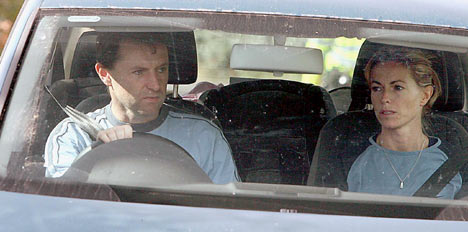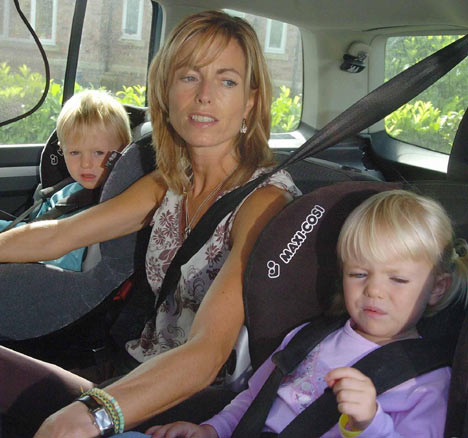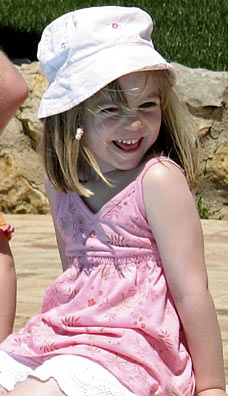|
Kate McCann has revealed that she struggled to control Madeleine McCann
after the birth of her and Gerry's twins, it was revealed today.
Missing
Madeleine would run around 'screaming...shouting for my attention', the
mother-of-three said.
In an
interview given to a Portuguese magazine before she was named as a suspect in
the case of the four-year-old's disappearance, Kate also said the first six
months of Madeleine's life were "very difficult" and that the girl had suffered
from colic.
 |
| Gerry and
Kate McCann in sombre mood today |
The revelations come as police said they were trawling through
Kate's medical records amid suspicions in
Portugal that she may have had a history
of depression.
The detailed analysis of her medical notes could provide them
with significant evidence against the GP, who is a suspect in the case of
Madeleine's disappearance.
Speaking about Madeleine's upbringing, Kate, a 39-year-old GP,
told Portugal's Flash! magazine: "She cried practically for 18 hours a day. I
had to permanently carry her around."
 |
|
Kate McCann with twins Sean and Amelie |
This
period explained "the strong bond between mother and daughter", she said.
Although
the arrival of the twins Sean and Amelie shook up Madeleine's life, she accepted
them very well, said Kate.
"She
managed to deal perfectly with this new reality, although she herself at the
time was still a baby.
"The
worst thing is that she started to demand lots of attention, especially when I
was breast-feeding them.
 |
|
Madeleine McCann:
Would run around screaming and demanding attention after her twin
brother and sister were born |
"She would run up and down screaming in the background, shouting
for my attention."
Mrs McCann also insisted that she and her husband were "truly
responsible parents" and had committed no crime.
Speaking of the night Madeleine disappeared, she said: "I was
sure immediately that she didn't walk out of that room. I never doubted that she
had been taken by someone.
"I went through a phase of guilt for not knowing what happened to
her. I blamed myself for thinking that the place was safe.
"But the certainty that we are truly responsible parents has
helped me carry on.
"I know that what happened is not due to the fact of us leaving
the children asleep. I know it happened under other circumstances."
Asked about whether she and her husband were responsible for
their daughter's disappearance, she said: "It cannot be considered a crime.
Someone committed one, but not us."
Portuguese newspapers continued to report today that Mrs McCann
will be re-interviewed in the UK this week by British police on behalf of the
Algarve authorities.
But a spokeswoman for the McCanns said the couple had to date
received no request for new interrogation.
The judge in the case, Pedro Daniel dos Anjos Frias, rejected
prosecutors' request to have the McCanns brought back to Portugal for further
questioning, the Correio da Manha said.
He insisted that the fresh interviews should be carried out by
British police in the UK, according to the paper.
The re-interviewing will only take place when further DNA testing
in Birmingham is completed, either tomorrow or Wednesday.
A letter of appeal will be sent to Britain, setting out all the
questions Portuguese detectives want to ask the couple, along with the evidence
supporting their hypothesis, the Correio da Manha reported.
A source told the paper there was only a "very low" probability
that Portuguese officers would be allowed to sit in on the interviews.
A McCann family spokeswoman said today: "We have been in touch
with the lawyers to try and get a steer on what is in the Portuguese papers.
"They assure us we have had no request to date for any further
questioning, either from the Portuguese police or in the UK."
She could not say whether the McCanns' legal team was expecting
the couple to be re-interviewed.
Since Kate and Gerry McCann were named as official suspects last
week, there have been suggestions in Portugal that Madeleine was given drugs on
the night of her disappearance.
The accusations have been strenuously denied by the couple but
have not been ruled out by police. Although the order to seize medical files
came from the Portuguese authorities, the background searches are being carried
out by Leicestershire police.
A copy of Mrs McCann's diary has also been seized by police, who
are now waiting for permission from the judge to seize and dismantle the
McCanns' hire car so they can search for "traces of skin".
It has been reported that DNA evidence with a match to Madeleine
was found in the Renault Scenic 25 days after their daughter vanished.
Yesterday it emerged the McCanns are trying to knock down
potential evidence retrieved after two British sniffer dogs, capable of
detecting blood and human remains, were used in the investigation in August.
One of the dogs picked up a "scent of deathî on items ranging
from Mrs McCann's clothes to Madeleine's favourite soft toy Cuddle Cat.
Leaked reports from the investigation have suggested that
Madeleine's parents could have accidentally killed her and then disposed of her
body using the car. Although they do not know the full details of the Portuguese
prosecutors' case against them, the McCanns are concerned that it may rest on
the dog's reaction.
The couple's legal team has now consulted the lawyers of an
American man accused of murdering his estranged wife in a case where "cadaver
dog" evidence was central. They want to highlight the judge's dismissal of such
evidence in the high-profile Eugene Zapata murder trial in Madison, Wisconsin.
Mr Zapata's estranged wife, flight instructor Jeanette Zapata,
was 37 when she vanished in October 1976 after seeing her three children off to
school.
Her body has never been found. Detectives suspected Mr Zapata of
involvement in her disappearance but did not charge him because of a lack of
evidence.
Police decided to conduct new searches using cadaver dogs and Mr
Zapata, 68, was charged with firstdegree murder last year after the dogs
indicated that they had scented human remains in an underfloor crawl space at
the former family home and other properties linked to him.
But the judge ruled that the dogs' ability to detect remains was
too unreliable, noting that no remains had actually been found. |





